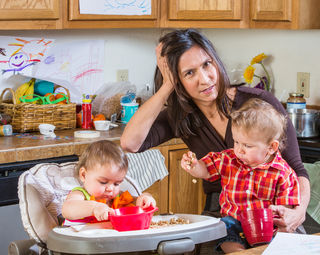Sex
Love (and Sex) in the Time of Corona
Report from the virtual couch of a certified sex therapist.
Posted March 29, 2020 Reviewed by Ekua Hagan

In the classic novel, Love in the Time of Cholera by the Nobel prize-winning author Gabriel Garcia Marquez, the character Florentino Ariza waits a lifetime to express the passion he feels for his one true love, Fermina Daza. She is what we'd call "the one that got away."
We are now all in the time of the coronavirus or COVID-19. People are spending more time than usual with their partners, while some folks are forced to remain physically apart from their lovers, partners, wives, husbands, girlfriends, or boyfriends. This is the first installment of observations from a virtual sex therapist's couch.
Garcia Marquez's novel explores how physical and emotional distance transforms what the characters and, by extension, the reader believe is true love and/or erotic passion. Physical distance is on a continuum, of course. On the opposite end of the distance spectrum is the emotional/physical self-quarantine, which cohabitating partners are practicing currently during the coronavirus crisis. This kind of insulated lifestyle could easily put a major crimp into a couples' sex life.
Being with your partner 24/7 can make some partners feel intruded upon and claustrophobic. The term cholera (cólera, as it is used in the novel's original Spanish) can also denote passion or human rage in its feminine form. Too much togetherness can certainly breed angry flames rather than an erotic spark.
Alternatively, the erotic space and passion might get kicked up a notch, thanks to just the right amount of anxiety around the treasuring of our beloved and the awareness that we are all potentially on borrowed time. The desire to (gently) grab life by the proverbial balls/vulva may be a couple's erotic trigger in this time of Corona.
Which Pedal Is Being Pushed to the Metal in the Relationships I See?
Through evidence-based research, sex therapists know that a person's libido can be measured by an excitatory process (compare it to a gas pedal in a car) and an inhibitory process (similar to the brake pedal). This measure is called the Dual Control Model of sexual processes. Due to the coronavirus crisis, many of our clients have expressed feelings of increased anxiety due to the unknown elements currently in question:
- Will I get sick?
- Are my parents (grandparents) going to survive this?
- What will happen to my job?
- Will the economy get back on track?
The anxiety could be increased to such an extent that their inhibitory pedal causes a dead stop to any feelings of erotic fantasy or desire.
I see clients frequently with high brake pedals who can't get in touch with their gas pedal. Common examples of inhibitory drives pre-COVID-19 included feelings like:
- Shame about one's sexual interest
- Worry about how your partner views your body
- The anxiety that you'll lose your erection
- Concern around potential pregnancy or STI transmission
Some current COVID-19 brake pedals I've heard described in the teletherapy sessions I've recently conducted and supervised since setting up CLS's virtual telepractice include:
- Partners are not on the same page regarding the threat of the coronavirus being brought into their home.
- Each partner can now view their partner's behaviors in grocery stores, unpacking groceries, face-touching habits 24/7.
- A partner may feel angry and scared that their partner isn't taking the precautions as seriously as they are.

- Increased fatigue due to having to keep up with one's job, taking care of one's children throughout the day, and doing household tasks.
- Frequently arguing about who is doing their fair share of increased chores, including meal prep and cleanup needed for three meals per day.
- Battling one's own worst fears about the potential that yourself, a family member, your partner, or a partner's family member will fall ill to the virus
- Temporarily sharing a home with parents and/or relatives with whom one normally doesn't live (think thin walls).
- Shorter tempers due to increased fears.
There are some couples, however, whose sex lives have flourished during the coronavirus crisis. They had shopped well for the sequestered time, having had the resources and forethought to purchase what they needed ahead of time (think toilet paper and hand sanitizer). Some clients have expressed a sense of freedom not having to participate in external obligations of their former daily routine like:
- Business lunches or dinners
- Extra meetings at the office
- Commuting
They've noticed their erotic bandwidth increased, as they're exercising more frequently, which makes them more hungry for sex.
Some of our clients either don't have children or no longer have children living at home, leaving them more flexibility to have morning and afternoon "playtime" breaks from their work.
If they have only one another to care for, they've remarked on a more expansive repertoire or sexual script. Their excitatory process or gas pedal has increased substantially. What kinds of things have they done?
They've made use of online adult stores by ordering new toys and role-play outfits to try out. Instead of binging on Netflix or Prime, they've used what I now like to call corona-creativity.

For those of you who want to increase your corona-creativity and put some pedal to the gas metal to expand your Sex Esteem®, check out some erotic sites and apps.
Some of our clients decided to return to their respective parents' homes out of state in order to get out of the congestion and increased threat of the coronavirus infection in New York City. Some of these partners were in the early stages of their relationship, living on their own and concerned for their families of origin. Some of our other CLS clients were in couples sex therapy at a precipitous inflection point in their relationship, with a treatment goal of making a decision as to whether they wanted to remain together or split up. Many of these couples have continued therapy virtually during this anxious time.
The COVID-19 crisis offered our individual clients a wake-up call as to how they and their partner each respond in a crisis. Some clients find they are more grounded than they thought they'd be, while others have expressed increased self-criticism for each decision they've made pertaining to their work or family life. They may observe their partner projecting their anger onto them, which has less to do with their actions and is more likely a projection of their partner's sense of flooded anxiety.

Other clients have expressed deep gratitude for their partner who is able to comfort them, take steps to ensure they're well-stocked with supplies, and be an emotional balm for each of them as well as their family. For many of these partners, their intimate life has not been interrupted but has remained a consistent place they can meet to feel comforted, aroused, bonded, and pleasured.
For those who are hunkered down on their own without partners in their lives, the challenge to keep sensually connected may seem more challenging. I'll be addressing this challenge as well as other situations in upcoming posts as part of this series: Love (and Sex) in the Time of Corona.
Some states have passed laws allowing therapists temporary licenses to practice teletherapy across state lines. This site has listed provisions for licensed social workers state by state.
References
The dual control model: current status and future directions. Bancroft J, Graham CA, Janssen E, Sanders SA.
J Sex Res. 2009 Mar-Jun;46(2-3):121-42
García, M. G., & Grossman, E. (1988). Love in the time of cholera. New York: Alfred A. Knopf.




